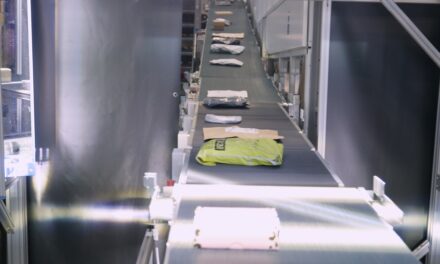
Leighton praises UK Royal Mail Group colleagues for better performance
Royal Mail today announced a pre-tax loss of £611 million for the year ending March 2003 – almost half the loss in the previous year – and is aiming to return to profit this current year.
Chairman Allan Leighton said last year had been a year of progress. The underlying loss from day-to-day operations was £197 million – over £120 million, 38% better than a year ago. It is the first improvement in trading performance for five years and Mr Leighton said:
“Our people have stopped the rot. They deserve the credit that for the first time in five years, trading performance is getting better, not worse. They have laid the foundations for a turnaround and put the company at the start of the road to profitability.”
But Mr Leighton cautioned: “The really hard work is ahead of us as the middle year of any company’s recovery plan is always the hardest. We have to keep the company’s pension scheme on a sustainable footing and we face major regulatory pressure as Postcomm attempts to impose the price at which competitors will be allowed access to our network.
“The task this year is to make the necessary changes in mail deliveries and transportation that will deliver the large cost savings essential for future profits and reward for our people.”
Adam Crozier, Royal Mail’s new Chief Executive who joined the leadership team in February, paid tribute to the efforts made to achieve the improved performance.
“We’ve got to not just maintain the momentum of change, but to increase the pace. Since joining the company, I’ve been hugely impressed by the pride and commitment of our people. I’m confident that we can move into profit this current financial year,” said Mr Crozier.
Making Royal Mail a great place in which to work was a crucial objective and he added: “Improving our people’s pay will play a key part in improving morale. I’m determined that savings made by making our operations more efficient will be shared fairly with our people.
“A priority is to eliminate unacceptable behaviour in the workplace. The launch of an independent helpline to stamp out bullying, harassment and discrimination, together with continued close working with the Equal Opportunities Commission, underscores Royal Mail’s commitment to its people.”
Progress was being made on making operational changes, Mr Crozier said: “There have been positive discussions with our unions on streamlining the transport network and introducing a single daily mail delivery, instead of the current two. I’m confident there will be an agreement to enable these crucial cost-saving programmes to move forward with consensus and buy-in by our people.
“I’m pleased the results show we are on target to pay a ‘Share in Success’ dividend to all our people by hitting profit targets next year, the final year of the renewal plan,” said Mr Crozier.
Mr Crozier said the most tangible evidence to date showing how Royal Mail was restructuring to cut its costs was the way in which Parcelforce Worldwide had now created a structure giving the prospect of ending losses stretching back for more than a decade.
“The company has ended or renegotiated loss-making contracts, halved its nationwide network of depots to just over 50, closed five parcel distribution centres, exited from the Standard parcel market and transferred this work to Royal Mail.
“The business, based around its domestic and international hubs at Coventry, now handles 40 million parcels a year – compared to 120 million before restructuring – and provides 30,000 business customers a variety of next-day and two-day guaranteed services in the UK and world-wide.
“Sadly, job numbers have reduced from 10,700 to around 5,700 but we managed to do this entirely by voluntary means,” said Mr Crozier.
Elmar Toime, the Executive Deputy Chairman who joined the leadership team in March, said Royal Mail’s First Class mail service over the year had achieved its best performance in seven years with 91.8% of First Class letters arriving the next working day after posting.
“We know there is substantially more work to do to improve our overall level of service to customers. But there have been encouraging improvements over the year. Across the 15 product and service categories in our licence, 14 of them saw a better cumulative performance last year than in the previous 12 months, and one equalled the prior year performance. Nonetheless, it is disappointing that we met only three of the 15 targets set out in the licence. We are determined to build further on the progress made.
“Last year was also the best year for industrial relations in a decade and that has meant that service to customers has been almost uninterrupted.”
Mr Toime added: “Much needed new technology is also being installed in our mail centres, including a new generation of electronic systems capable of reading poorly addressed mail. This should lead to further improvements in performance and service to customers.”
David Mills, Post Office Ltd’s Chief Executive, said the last year had seen the end of an era for payment of benefits and pensions. “The Post Office’s 17,200 branches were fully ready for the switch,” he said.
“The banking technology we’ve installed has hugely expanded the Post Office network’s capabilities. We’re handling more than 2 million banking transactions a month from a wide range of accounts and we have also launched the Post Office Card Account, providing pensioners and benefit recipients with a no-frills, Post Office-based way of continuing to collect their benefit in cash at network branches.
“The challenge will be to retain as many of our customers as possible as the switch to direct payment of benefits and pensions gathers momentum.”
Mr Mills said funding had been secured for the maintenance of rural branches, as well as investment in urban offices and compensation for those urban subpostmasters who had signalled their intention to leave the business under a planned and staged programme to close some 3,000 urban branches.
“We are determined that in urban areas, there will be a Post Office branch within a mile of 95% of our customers,” said Mr Mills.
He added that 1,300 managers and support staff in Post Office Ltd had left the business last year – as part of the overall 16,600 job reductions company-wide.
Allan Leighton said that there remained an urgent need to make substantial further progress in the company’s renewal plan because of a hypothetical deficit of £4.6 billion in the Royal Mail pension fund, following adoption of FRS17 accounting standards. He stressed however that: “Our people currently in the scheme should have nothing to fear. We have factored into our business plans additional payments to the fund by the company until the deficit is cleared
“We are committed to the ongoing funding of the plan and will manage the shortfall as part of our everyday activities, pumping some £100 million into pensions each year until the deficit is cleared. It is, however, an ongoing risk for the organisation and increases our need to deliver the fundamental change that underpins our renewal plan.”
He also warned that a further threat to the company’s future was pressure from the postal regulator, Postcomm, to impose an unrealistically low price that other companies would pay Royal Mail for use of its sorting and delivery network.
“It’s absolutely essential the regulator gets the price of access for competitors right. Our initial view is that the sums are again wrong, and that once again we are looking at flawed proposals which will produce a significant negative margin for Royal Mail – not the claimed profit. If this is the case, we won’t hesitate to challenge the plan in the High Court.”
Allan Leighton concluded: “This year will be testing for Royal Mail but I’m confident the worst results are behind us. The enormous goodwill we have in our people, our brands and our customers means that we’re now within sight of regaining our position as the world’s best postal service.”
Ends
Issued by Royal Mail Group plc
148 Old Street
LONDON
EC1V 9HQ
www.royalmail.com/group
Highlights
The key points of the 2002/2003 results are:
Financial
· Turnover from continuing operations of £8,299 million was down by £109 million on the previous year. However, as 2001/2002 was a 53-week year for accounting purposes, while last year had 52 weeks, the underlying picture was a small rise year-on-year in turnover of £50 million, a rise of 0.6%.
· Losses from operations were, on average, £0.75 million per working day, compared to £1.2 million the previous year.
· Exceptional costs totalled £695 million, compared to £1.1 billion the previous year. Most of the new exceptionals related to provisions for voluntary redundancy.
· Post Office Ltd’s losses grew to £194 million before exceptionals, up £31million on the previous year. The loss underlines the need for the current urban re-invention programme which will, by 2005, see some 3,000 fewer urban sub post offices.
· Parcelforce Worldwide, which has successfully completed its transformation to an express-only service for time-guaranteed deliveries for business customers, lost £187 million on operations, up from £94 million the previous year. It remains on course to break even in 2004/2005.
· Royal Mail’s UK mails operation made a profit of £66 million, including philatelic sales and Royal Mail’s Special Delivery guaranteed and insured, next-day delivery service. Royal Mail made a loss on its core mail business.
· International mail and Royal Mail’s European parcels business, made an operating loss of £12 million, an improvement of the previous year’s loss of £58 million.
Operational
· Days lost to strike action fell by 90%.
· Mail volumes grew by just 0.3% and the average daily mail bag last year contained just over 82 million letters.
· 16,600 jobs have gone from the company – around 5,500 people have taken voluntary redundancy, some 6,500 other jobs have transferred to other firms, mainly as a result of outsourcing deals, but also because of the contract for TV licensing going to Capita, while around 4,600 people were not replaced when they left the company.
www.royalmail.com











